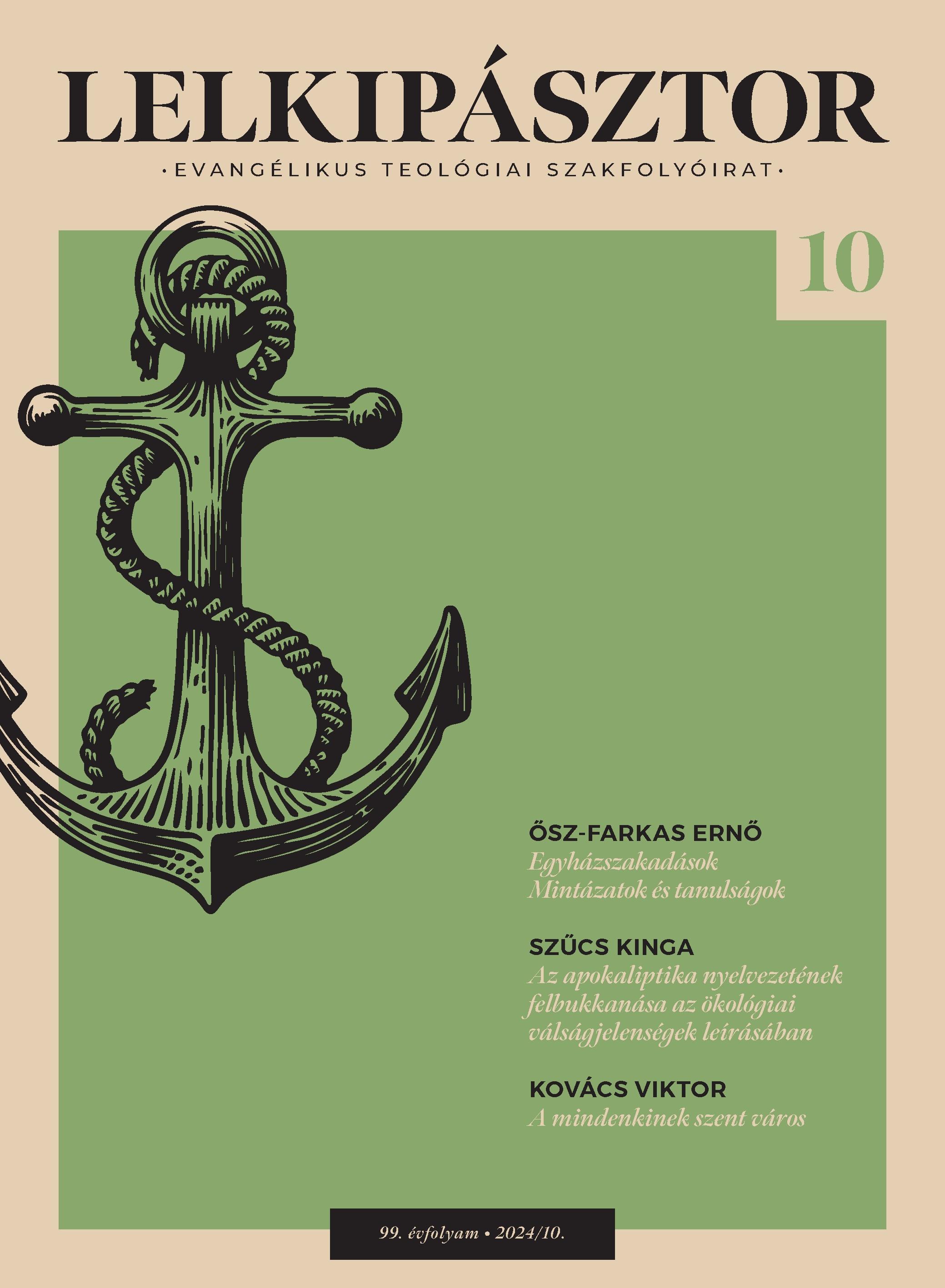The Rise of Apocalyptic Language in the Description of Ecological Crisis Phenomena
Abstract
For more than half a century, scientific predictions have sounded the alarm bells to no avail; it is only now, at the end of the first quarter of the twenty-first century, that it is generally accepted that we are living in a state of polycrisis, with the environmental crisis as one of the most important factors. Descriptions of the crisis are found in both everyday media and academic analysis, and the language, imagery, and other stylistic features of the different genres often show a high degree of similarity, which is due in small part to the influence of the two approaches on each other, but is more determined by the common source area of linguistic orientation: biblical (and apocryphal) apocalypticism. In this paper, the author examines the most commonly used concepts that refer to the relationship between crisis experiences and end times/age changes, and which biblical and apocryphal texts from which contemporary authors are keen to draw on apocalyptic visions. The paper also discusses the meanings that emerge from the secular use of originally religious texts, and seeks answers to the question of how, beyond superficial correspondences, we can make the biblical view of history meaningful and relevant to our contemporary thinking on a communal and personal level.
References
Ágoston, Csilla et al. 2022. The psychological consequences of the ecological crisis. Three new questionnaires to assess eco-anxiety, eco-guilt, and ecological grief. Climate Risk Management, 37. évf. 100441. https://doi.org/10.1016/j.crm.2022.100441
Beyerle, Stefan 2015. Die Apokalyptik als „Mutter aller christlichen Theologie” – Die Apokalyptik im Alten und Neuen Testament. Rocznik Teologiczny, LVII. évf. 4. sz. 491–505. o.
Beyerle, Stefan 2021. Apokalyptik (AT). Das Wissenschaftliche Bibellexikon im Internet, https://bibelwissenschaft.de/stichwort/13517/.
Böttrich, Christfried 2014. Apokalyptik (NT). Das Wissenschaftliche Bibellexikon im Internet, https://bibelwissenschaft.de/stichwort/49908/.
Fröhlich Ida 2023. Apokaliptika és apokalipszisek – Egy műfaj eredete. Axis, IV. évf. 1. sz. 13–32. o. https://doi.org/10.61176/Axis.2023.4.1.2
Härle, Wilfried 2012. Dogmatik. 4. kiad. De Gruyter, Berlin–Boston. https://doi.org/10.1515/9783110272765
Hellholm, David (szerk.) 1983. Apocalipticism int he Mediterranean World and the Near East. J. C. B. Mohr (Paul Siebeck), Tübingen.
Jonas, Hans 1979. Das Prinzip Verantwortung. Versuch einer Ethik für die technologische Zivilisation. Insel Verlag, Frankfurt am Main.
Jonas, Hans 2005. Az emberi cselekvés megváltozott természete. In: Lányi András – Jávor Benedek: Környezet és etika. Szöveggyűjtemény. L’Harmattan, Budapest. 25–36. o.
Käsemann, Ernst 1970. Die Anfänge christlicher Theologie. In: uő: Exegetische Versuche und Besinnungen. 2. köt. 3. kiad. Vandenhoeck & Ruprecht, Göttingen. 82–104. o.
Martini, Carlo Maria – Eco, Umberto 2000. Miben hisz, aki nem hisz? Ford. Gál Judit – Dorogi Katalin. Európa Kiadó, Budapest.
Moltmann, Jürgen 2005. Minden végben kezdet rejtezik. Kis reménytan. Ford. Gromon András. Bencés Kiadó, Pannonhalma.
Nagel, Alexander-Kenneth 2021. Corona und andere Weltuntergänge. Apokalyptische Krisenhermeneutik in der modernen Gesellschaft. Transcript Verlag, Bielefeld. (Kulturen der Gesellschaft 48.) https://doi.org/10.14361/9783839455951
Pemsel-Maier, Sabine 2021. Kein Katastrophenszenario. Zum Potential apokalyptischen Denkens in der ökologischen Krise − Wegmarken für eine wenig bedachte Dimension der Eschatologiedidaktik. Religionspädagogische Beiträge / Journal for Religion in Education, 44. évf. 2. sz. 97−106. o. http://dx.doi.org/10.20377/rpb-134
Schleissing, Stephan 2020. Warum Apokalyptik und „offene Zukunft” keine Gegensätze sind. GlobKult, szeptember 30. https://globkult.de/blogs/hans-von-storch-zur-sache-klima/1952-warum-apokalyptik-und-offene-zukunft-keine-gegensaetze-sind. (Megtekintés: 2024. szeptember 15.)
Taxacher, Georg 2010. Apokalyptishe Vernunft. Das biblische Geschichtsdenken und seine Konsequenzen. WBG, Darmstadt.
Tilly, Michael 2012. Kurze Geschichte der Apokalyptik. Aus Politik und Zeitgeschichte, december 12. https://www.bpb.de/shop/zeitschriften/apuz/151302/kurze-geschichte-der-apokalyptik/. (Megtekintés: 2024. szeptember 15.)
Troeltsch, Ernst 1925. Glaubenslehre. Nach Heidelberger Vorlesungen aus den Jahren 1911 und 1912. Duncker & Humblot, München–Leipzig.
Vondung, Klaus 1988. Die Apokalypse in Deutschland. DTV, München.

This work is licensed under a Creative Commons Attribution-NonCommercial-NoDerivatives 4.0 International License.




